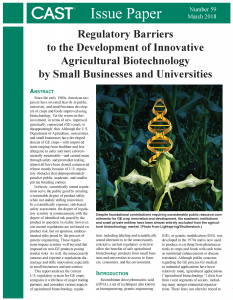CAST to Release Comprehensive Paper on FIFRA and ESA at the CropLife & RISE Regulatory Conference
 Regulatory Barriers to the Development of Innovative Agricultural Biotechnology by Small Business and Universities
Regulatory Barriers to the Development of Innovative Agricultural Biotechnology by Small Business and Universities
The scientific community is overwhelmingly positive about biotech plant breeding and the benefits for farmers, consumers, and the environment. But the authors of this paper demonstrate that the current process-based U.S. biotechnology regulatory system is a barrier to such agricultural innovation. The regulatory system needs to be adjusted, or “public, academic, and small business entities will continue to be frustrated in using these safe tools to deliver useful products.”
This report examines the current U.S. regulatory system for genetically engineered (GE) crops, compares it with those of major trading partners, and considers the effects it has on agricultural biotechnology. In theory, scientifically sound regulations serve the public good by assuring safety while not stifling innovation. But current regulations are sometimes based on spurious, undocumented risks–onerous, expensive regulations discourage innovation, especially in small businesses and universities.
Led by Task Force Chair Alan McHughen, these experts show that despite foundational contributions requiring considerable public resource commitments for GE crop innovation and development, academic institutions and small private entities have been almost entirely excluded from the agricultural biotechnology market.
This issue paper explains the problem by examining several key topics:
Unreasonable barriers result in biotech innovation projects that have been slowed down or shelved. Regulations need to align with the stated public policy goal of reasonably assuring safety–in a way that is commensurate with the degree of risk posed. Otherwise, public, academic, and small business entities will continue to be frustrated in using these safe and beneficial tools. The 35-year history of public and small private investment in agricultural biotechnology will continue to be squandered.
This CAST Issue Paper (IP59) and its companion Ag quickCAST are available online at the CAST website, along with many of CAST’s other scientific publications. CAST Issue Papers, Commentaries, and Ag quickCASTs are FREE.
Alan McHughen (Chair), University of California, Riverside
Kent J. Bradford, University of California, Davis
Neal Carter, Okanagan Specialty Fruits Inc.
Dennis Eriksson, Swedish University of Agricultural Sciences
Elizabeth Grabau, Virginia Tech
Elizabeth Hood, Infinite Enzymes
Wayne Parrott, University of Georgia
Jeff Wolt, Iowa State University
Alan McHughen-Phone: 951-827-7532; Email: alanmc@citrus.ucr.edu
Kent Schescke-Phone: 515-292-2125, ext. 231; Email: kschescke@cast-science.org
Your donation to CAST helps support the CAST mission of communicating science to meet the challenge of producing enough food, fiber and fuel for a growing population. Every gift, no matter the size, is appreciated.